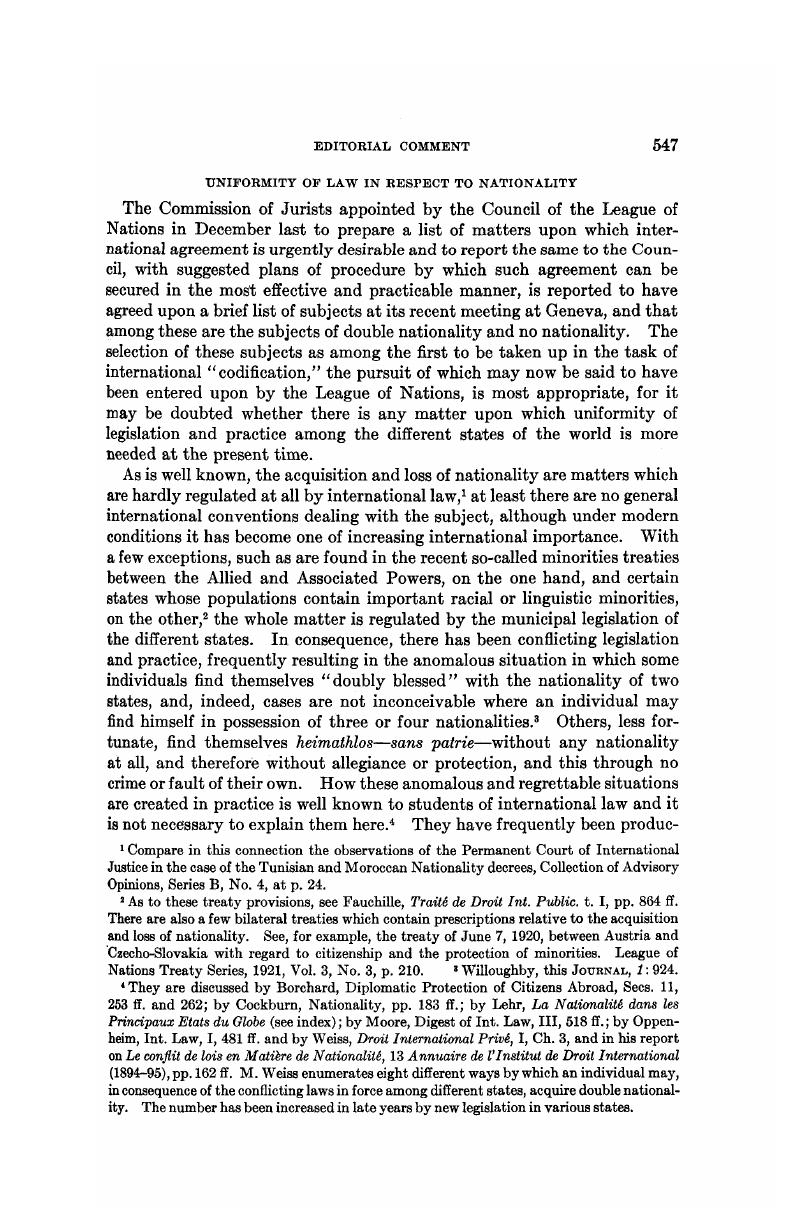Published online by Cambridge University Press: 04 May 2017

1 Compare in this connection the observations of the Permanent Court of International Justice in the case of the Tunisian and Moroccan Nationality decrees, Collection of Advisory Opinions, Series B, No. 4, at p. 24.Google Scholar
2 As to these treaty provisions, see Fauchille, Traitt de Droit Int. Public, t. I, pp. 864 ff.Google Scholar There are also a few bilateral treaties which contain prescriptions relative to the acquisition and loss of nationality. See, for example, the treaty of June 7, 1920, between Austria and Czecho-Slovakia with regard to citizenship and the protection of minorities. League of Nations Treaty Series, 1921, vol. 3, No. 3, p. 210.Google Scholar
3 Willoughby, this Journal, 1: 924.
4 They are discussed by Borchard, Diplomatic Protection of Citizens Abroad, Sees. 11, 253 ff. and 262;Google Scholarby Cockburn, Nationality, pp. 183 ff.;Google Scholar by Lehr, La Nationality dans les Principaux Etats du Globe (see index); by Moore, Digest of Int. Law, III, 518 ff.;Google Scholarby Oppen-heim, Int. Law, I, 481 ff. and by Weiss, Droit International Privi, I, Ch. 3, and in his report on Le conflit de lois en Matibre de Nationality, 13 Annuaire de I'Institut de Droit International (1894–95), pp. 162 ff. M. Weiss enumerates eight different ways by which an individual may, in consequence of the conflicting laws in force among different states, acquire double nationality.Google Scholar The number has been increased in late years by new legislation in various states.
5 See the cases referred to by Borchard, op. cit., p. 589. n. 1–2, and by Moore, International Arbitrations, Vol. III, Ch. LIV.Google Scholar
6 English text in this Journal, 8: 217 ff.Google Scholar Comment on the same by Flournoy, 8 ibid., 477 ff.; by Scott, 9 ibid., 939, and by Hill, 12 ibid., 356. By the Treaty of Versailles, the effect of the Delbriick law was nullified. By article 278 Germany undertook to recognize any new nationality which had been or might in the future be acquired by her nationals under the laws of the Allied and Associated Powers, and to regard such persons as having, in consequence, severed “in all respects” their allegiance to Germany.
7 There are said to be more than thirty countries whose laws would produce this effect. Flournoy, “The New Married Women's Citizenship Law,” 33 Yale Law Journal, p. 167.Google Scholar
8 They are listed in 49 Clunet, Journal du Droit Int. (1922), pp. 618–619, in the Revue de Droit International Prive (Darras and de Lapradelle), vol. 16 (1920), pp. 273–74, and by Hill, Cyril D., this JOURNAL, 18: 728 (1924).Google Scholar
9 Flournoy, 33 Yale Law Journal 163, citing the Cong. Record of 1922, pp. 9063, 9057 and 9064.Google Scholar
10 Text in 15 Annuaire de I'Institut de Droit International, 241 ff., and in Resolutions of the Institute of International Law, 133–135.Google Scholar
11 De Lapradelle, De la Nationality d'Origine, p. 390.Google Scholar
12 Report of the Thirty-first Conference, Vol. I, p. 257.Google Scholar
13 See especially the remarks of Messrs. Le Grand, Kuhn, and Babinski (ibid,, pp. 244 ff.), and the address of Seflor Garcia entitled: El Probkma de la Doble Nacwnalidad (ibid., pp. 493 ff.).
14 Report of the Thirty-second Conference (1923), p. 23.Google Scholar
15 See especially the remarks of Mr. J. Arthur Barratt, K. C, ibid., p. 35.
16 Text ibid., pp. 45–47, and this Journal, 18: 734.
17 Cong. Record, March 17, 1924, p. 4520.Google Scholar
18 Bles, “Un Droit Uniforme sur la Nationality,” 48 Rev. de Droit Int. et de Leg. Comparie (1921), p. 514.Google Scholar Compare also the remarks of Professor Valery regarding the “almost scandalous conditions” which were revealed during the late war, resulting from the diversity and conflicts of municipal legislation in respect to nationality. “Des Influences probables de la Guerre Mondiale sur VAvenir du Droit International Prive”, 15 Rev. de Droit Int. Prive (1919), pp. 1 ff.Google Scholar
19 Compare in this sense Weiss, Droit International Prive, I, 20, and his article in 45 Clunet, p. 466.Google Scholar